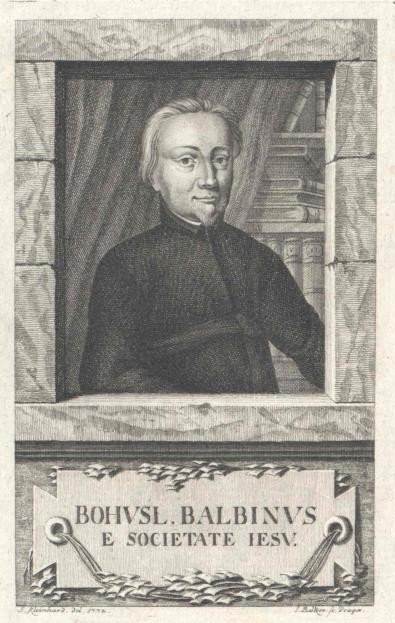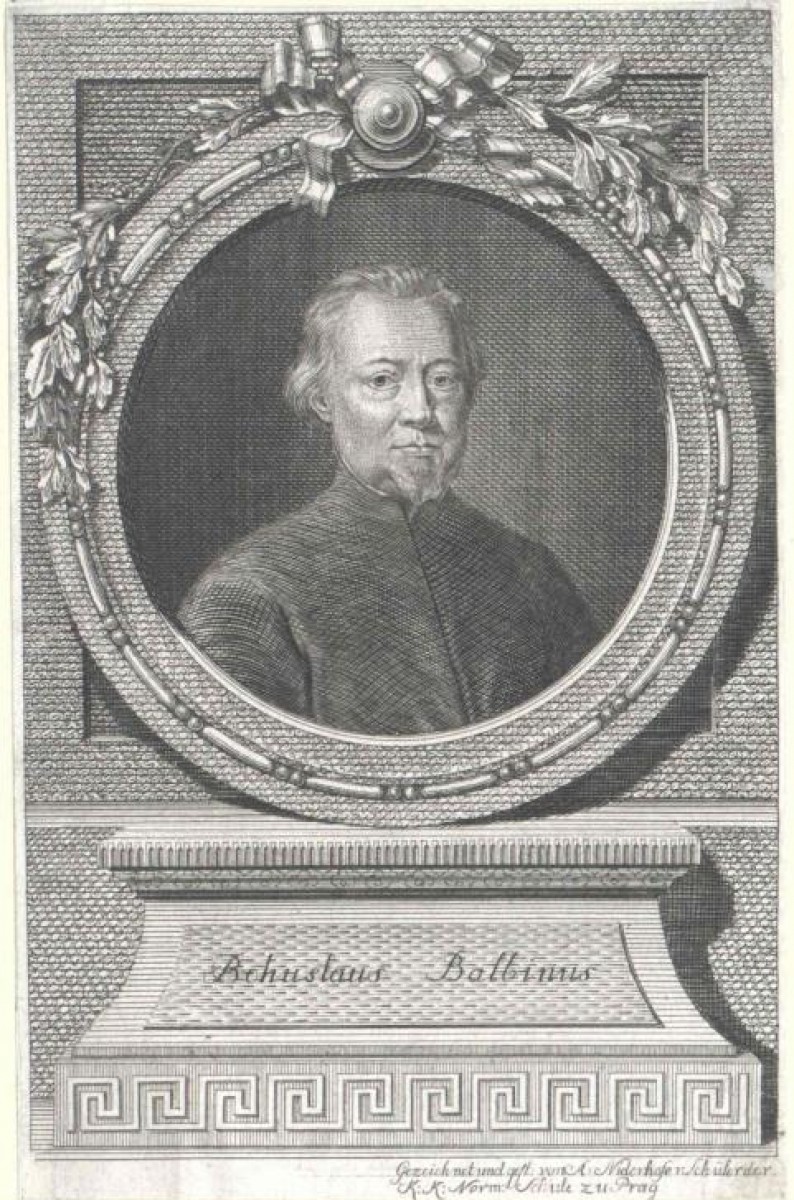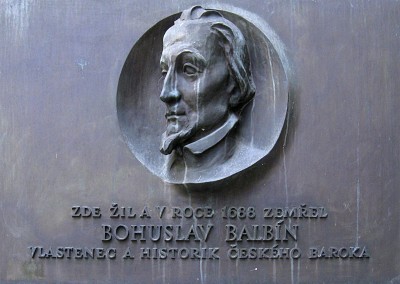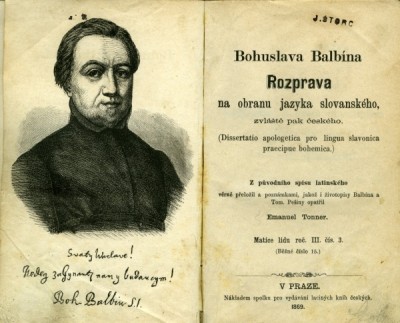| Příjmení: Surname: | Balbín | Balbin |
| Jméno: Given Name: | Bohuslav | Bohuslav |
| Jméno v originále: Original Name: | Bohuslav Balbín | |
| Fotografie či obrázek: Photograph or Picture: | | |
| Hodnost: Rank: | - | - |
| Akademický či vědecký titul: Academic or Scientific Title: | - | - |
| Šlechtický titul: Hereditary Title: | - | - |
| Datum, místo narození: Date and Place of Birth: | 03.12.1621 Hradec Králové | 03.12.1621 Hradec Kralove |
| Datum, místo úmrtí: Date and Place of Decease: | 28.11.1688 Praha | 28.11.1688 Prague |
| Nejvýznamnější funkce: (maximálně tři) Most Important Appointments: (up to three) | - | - |
| Jiné významné skutečnosti: (maximálně tři) Other Notable Facts: (up to three) | - | - |
| Související články: Related Articles: | | |
| Zdroje: Sources: | http://cs.wikipedia.org/wiki/Bohuslav_Balb%C3%ADn | |
Balbín, Bohuslav
Bohuslav Balbín
Bohuslav Ludvík Balbín of Vorličná was born on December 3, 1621 in Hradec Králové, as the youngest of the seven children of Lukáš Škornice, a royal burgrave of Pardubice, Balbín of Vorličná and Zuzana Vodičková. A year later, the knight Lukáš Škornice from Vorličná died and Mrs. Zuzana also moved with her children to the Častolovice chateau of her family friend Otto from Oppersdorf, the governor of the Hradec Králové region. As a child, Balbín used to be ill, but in the end he survived all six of his older siblings. In addition to illness and his father's untimely death, his childhood was influenced mainly by his mother's deep piety. His mother also introduced him to Hájek's chronicle, which the boy allegedly read three or four times before he reached the age of seven, thus gaining a lifelong interest in literature and history.
Thanks to the financial support of the family's supporters, Balbín entered the Latin school of the Benedictines in Broumov at the age of nine ( 1631), followed by Jesuit schools in Jičín, Prague and Olomouc. In Olomouc, he befriended the prefect of the dormitory, a Pole of Lithuanian origin Mikołaj Łęczycki ( Latin Lancicius). Under his influence, he joined the Jesuit order in 1636 at the age of fifteen and left for the Brno novitiate. After two years, he took a religious vow here and completed his humanities studies in 1639 in Kłodzko. In the autumn of 1639 he was sent to Prague, where he began studying philosophy in Klementinum. After achieving a master's degree, he began teaching in 1642 in the Prague dormitory of St. Klimenta at a Latin school. In 1645 he left teaching and became a student again, this time in theology and history. During the Swedish siege of Prague in 1648, he fought in the Academic Legion and was wounded. A year later he was ordained a priest and in 1650 he completed his studies. He took part in Catholicization missions in various regions of the Czech lands, such as Kunvald, Rychnov or Žamberk, but because he did not have much preaching skills, he returned to teaching in 1653 and a year later made higher-level religious vows.
During his further teaching practice, he worked at the Jesuit dormitories in Kłodzko, Český Krumlov, Prague, Brno, Jičín, and for the longest time in Jindřichův Hradec. In 1661 he had to end his career as a teacher. The reason is sometimes " moral" decline, other times patriotic influence on students. It is possible that his literary work at the time also played a role, as he received a complaint from Roman superiors that he had violated " religious modesty[/i" by ironic criticism of one of his colleagues' books. He was threatened with dismissal from the order, but in the end he was only transferred to the Jičín dormitory in 1661, exclusively as a historian of the order. The performance gave him the task of writing the history of the Czech province of the Jesuit order.
Balbín's stay in Jičín did not last long. He was instructed from Rome to be ordered to leave Bohemia. The Czech provincial Saxius interpreted this in his own way and in 1663 sent Balbín to the Jesuit college in Klatovy, where he was to continue to work as a "[a] historian of the Czech Jesuit province". In November 1664 he was transferred to Český Krumlov and again to Jičín in 1666, where after two years he finally wrote at least the first part of the history of the Czech order province. i] Excerpt from the history of the Czech ", which was approved by the Jesuit censors in 1669. After the printing of about half of the work, however, the burgrave Count Bernard Ignác of Martinů, the son of Martinice once overthrown from the windows of Prague Castle, issued a ban in further printing. continue and confiscate the copies so far.
At the end of 1671, Balbín was sent as a punishment back to the exile in Klatovy, where in 1672–73 he wrote his perhaps most famous work “ in the Czech Republic, also on the pernicious intentions of his extermination and other matters related to it, the debate is short but true “. In it, he accused the then ruler that the country was disrupted in all respects and distributed to foreigners who impoverish it and suppress its identity, destroy ancient national institutions and ancient language, oppress the poor and defenseless. It was such a bold work that he did not try to publish it in print at all, and he preferred to hand over the handwritten manuscript to his friend, Tomáš Pešin of Čechorod *. This caution paid off for him, because in 1976 he was finally able to settle permanently in Prague.
During his life, Bohuslav Balbín collected material for an extensive ethnographic work entitled " Diversity from the History of the Kingdom of Bohemia", which he gradually realized and which was published in volumes from 1679 until his death ( 1688). However, less than one project was published, much of the work remained in the manuscript. After the first volume " Diversity" was published, Balbín became ill with pleurisy and his health deteriorated so much that doctors forbade him to write because they feared the worst. However, Balbín did nothing about the ban, until in December 1682 he had to go to bed and in 1683 he was wounded by a stroke, his right hand was paralyzed, but he could still think and talk. The sequel " Diversity" dictated the scribe. Gradually, however, dictation began to strain him, and his health continued to deteriorate. In 1687 he was again wounded by a stroke, this time his right arm and also his right leg were affected. He died four days before his 67th birthday on November 29, 1688. He is buried in the crypt of the church of St. Salvator in Prague.
* It was not published until 1775 by the historian František Martin Pelcl, under the title " Defense of the Slavic language, especially Czech".
Sources:
Zdeněk Tichá: The Life and Work of Bohuslav Balbín (1986)
Michaela Novotná: Bohuslav Balbín: Notes on his work, especially on the so-called Debate (Bachelor Thesis, Brno 2010)
Lucie Šlezingrová: Bohuslav Balbín: The Great Personality of the Czech Baroque (Bachelor Thesis, Brno 2010)
Jan Jiří Balzer: Austrian National Library, bildarchivaustria.at, commons.wikimedia.org
Austrian National Library, bildarchivaustria.at, commons.wikimedia.org
Ergane: commons.wikimedia.org
encyklopedie.c-budejovice.cz
vzdynahore.cz
Balbín Bohuslav: Epitome historica rerum Bohemicarum, Praha 1677, titulní list opatřený ilustrací Karla Škréty.
Reklama
Join us
We believe that there are people with different interests and experiences who could contribute their knowledge and ideas. If you love military history and have experience in historical research, writing articles, editing text, moderating, creating images, graphics or videos, or simply have a desire to contribute to our unique system, you can join us and help us create content that will be interesting and beneficial to other readers.
Find out more



